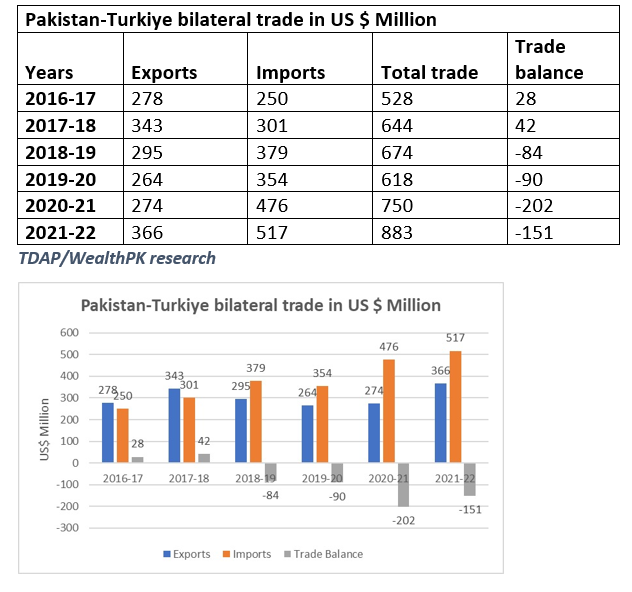INP-WealthPk
Arsalan Ali
In a bid to bolster bilateral trade and tap into the immense potential for exports, Pakistan has set its sights on Turkey. The two countries recently signed a Preferential Trade Agreement (PTA), laying the foundation for a fruitful economic partnership with a strategic goal of achieving $5 billion in bilateral trade in the medium term, said a senior official. Muhammad Usman Baig, International Trade Officer at Trade Development Authority of Pakistan (TDAP), told WealthPK that under the PTA, Pakistan has gained market access to 261 tariff lines, encompassing a range of products.
He added that Pakistan’s global export of these products is $5.1 billion, while Turkey's global import of these products is $7.6 billion. “Notably, textile products, a major export item for Pakistan, will be included in the agreement in the near future, further unlocking the full potential of this collaboration,” he said. Usman said some of the potential products eligible for zero and minimum custom duties under the PTA include mangoes, animal casings, dates, rice, gum confectionery, jelly confectionery, food preparation in powder form, tomato ketchup and tomato sauces, body lotion, creams, emulsions and oils, soaps, made-ups from paper or cardboard, colored and colorless glasses, and safety razors.
“These products represent a promising avenue for boosting exports and optimising trade potential with Turkey,” the official said. He stated that trade balance between Pakistan and Turkey has favored the latter in recent years. In the fiscal year 2021-22, total trade between the two countries amounted to $883 million, with Pakistan's exports to Turkey reaching $366 million, while imports stood at $517 million.

To address this trade deficit, the official said the PTA holds significant promise. He said that by offering concessions on 130 tariff lines, Pakistan aims to create a mutually beneficial trade environment that stimulates growth for both nations. He added that Turkey's global exports of these products amounted to $23 billion (12% of Turkish global exports), while Pakistan's global imports of these products reached $6 billion. This shows that there is substantial scope for enhancing trade volumes and narrowing the trade gap.
He maintained that the PTA, commonly referred to as the Trade in Goods Pact, incorporates comprehensive provisions on bilateral safeguards, balance of payment exceptions, and dispute settlement mechanisms. He went on to say that these measures ensure a stable and sustainable trade relationship between the two countries, fostering confidence and reliability for businesses on both sides.
Usman said it is crucial for Pakistan to seize the opportunities presented by this trade agreement, leveraging its strengths in key export sectors to tap into Turkey's market. Textile products, once included in the PTA, are expected to contribute significantly to boosting Pakistan's exports to Turkey. He stated that as both nations embark on this journey of economic cooperation, the potential for trade growth is immense.
With an array of promising products and the preferential trade agreement as the cornerstone, Pakistan aims to enhance its exports to Turkey, ultimately strengthening economic ties and creating a win-win situation for both countries. “As Pakistan explores new horizons in trade and collaboration with Turkey, the stage is set for a transformative partnership that will shape the future of commerce between these two nations,” said the official.
During the first 10 months (July-April) of the current fiscal year, Pakistan's exports to Turkey rose slightly to $269.833 million from $266.452 million year on year. This marginal increase of $3.381 million highlights the country's steady progress in exploring trade opportunities with Turkey.
However, the overall trade scenario between the two nations poses challenges for Pakistan. Imports from Turkey during the period under review amounted to $405.650 million, significantly surpassing Pakistan's exports. As a result, a trade deficit of $135.817 million was recorded. Exports to Turkey were flat in April 2023 at $29.419 million, almost the same as $29.787 million a year ago.
Credit: Independent News Pakistan-WealthPk




